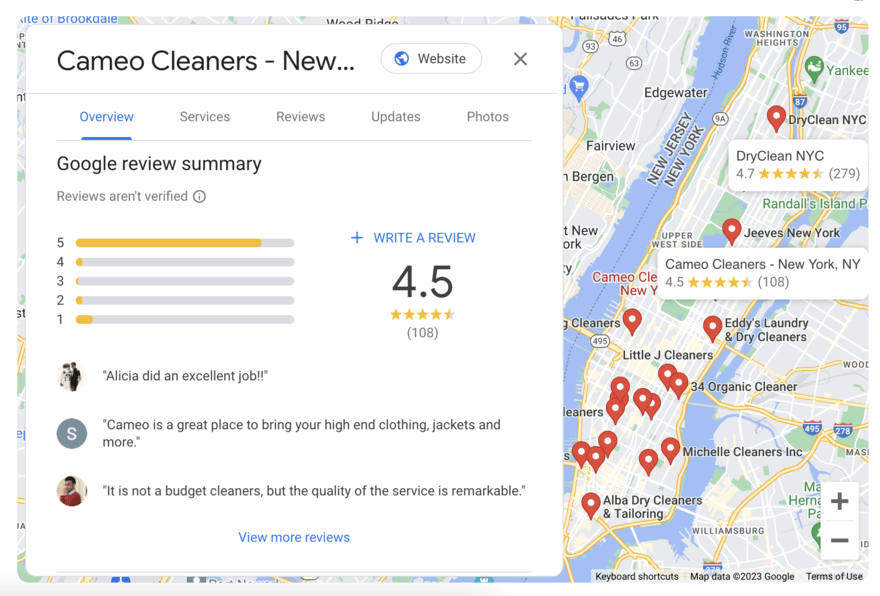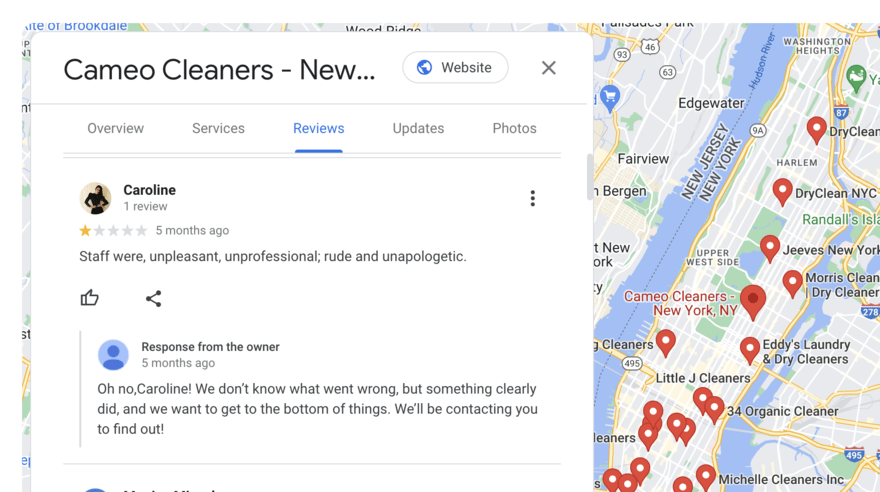Reviews vs SEO: How Google Reviews Influence Your SEO
If you click to purchase a product or service based on our independent recommendations and impartial reviews, we may receive a commission. Learn more
We all know that good customer reviews can be a great way of building customer trust in your brand, but did you know that they can also impact your SEO?
Google reviews, in particular, can play a big part in the success of your SEO strategy and how well your website ranks for your target search terms.
Google factors in customer reviews, both positive and negative, when ranking websites. But, when it comes to SEO tasks for your business, focusing on building Google reviews is often low down the list.
In this article, we’ll take a look at how Google reviews impact your SEO and what you can do to make sure your website is benefitting from positive Google Reviews. It’s time for reviews vs SEO…
What are Google Reviews?
Google reviews are customer reviews collected and managed via Google. To collect Google reviews you’ll need to have a Google Merchant account – Google will then contact your customers for you, asking them to leave a review by filling out a short survey.
Customers can also leave a Google review by clicking on your Google business listing.
You can then display these Google reviews on your website and other marketing platforms such as social media. Google will also use these reviews to create your star rating on your business profile.
How Google Reviews Impact SEO
The big question is: do reviews help SEO? Yes. Google trusts its users, and the search engine’s algorithm uses customer reviews to help determine where a website should rank in search results.
Just like how a potential customer uses reviews to decide whether or not to make a purchase, Google uses them to decide whether or not to rank your website (among other things).
Google will look for various factors when determining how to rank your website, such as a high star rating or mention of long-form keywords in reviews.
Google reviews play a particularly important role when it comes to local SEO and targeting local users. The platform uses three key factors when ranking websites for local search terms: relevance, distance, and prominence.
So for example, if a user searches for “Thai food in New York”, Google will aim to display websites that offer:
- Thai Food
- Are based in New York
- Have positive Google reviews
This means that a Thai restaurant with multiple positive Google reviews could easily outrank a competitor who doesn’t have as many reviews, even if they’re closer in proximity to the user.

Google reviews also impact your click-through rate (CTR) which in turn affects your rankings. Users will be much more likely to select a result with a good amount of reviews compared to one without. And the higher your CTR, the higher Google will rank your website.
Find Out More
Still have questions about Google’s ranking factors? Our SEO Basics guide is a beginner-friendly introduction to SEO
What Is Google Looking for in Your Google Reviews?
Google is always looking for off-site SEO ranking factors – meaning factors that are external to your website, such as Google reviews. So what exactly does Google look for in your reviews?
1. High-Star Ratings
One of the first things Google will look for is a high-star rating. The reality is that Google trusts your customers much more than it trusts you. Of course, you’re going to say your brand is great, but what do your customers think?
If customers leave positive reviews with a high rating, Google will look upon your website favorably and will be more likely to rank your pages in a high position for your target search terms.
2. Mention of Long-Form Keywords
Keywords in reviews are important but need to come naturally – you can’t go around asking people to mention keywords ahead of giving feedback. When Google trawls through your reviews, it’ll be on the lookout for certain long-form keywords.
The good news is that if you’re providing a relevant service to the keywords you’re targeting, it’s likely customers will use them organically. For example, if you sell pet accessories and multiple reviews mention “dog collar” Google will determine you to be a relevant website for this search term.
Advice from the Experts
Top tip! You can also use your existing Google reviews to determine what keywords to target. Take a look at the reviews your customers have left and see if there are any specific words or phrases that are being used repeatedly. You can then aim to target these as part of your SEO strategy since you can see users are using them about your brand.
3. Recency of Reviews
Google will also look at the recency of your reviews, meaning it factors in when customers leave feedback. If a ton of time has passed since a customer left a review, the less value it has to Google. The search engine will be looking to rank websites that have recent positive reviews, not ones that are years old.
Potential customers can’t get an accurate depiction of your business if all of the feedback is outdated.
4. Responses to Reviews
Responding to Google reviews – both good and bad – is an important part of your wider marketing strategy because it shows customers you appreciate their feedback and listen to their needs or pain points. It also helps your SEO too!
Google will be looking specifically for brands that reply to their Google reviews and it’ll reward the businesses that do. Your response is also a great place to include your target keywords since Google will trawl through them when looking for mentions.
Strategies for Optimizing Google Reviews for SEO
When it comes to reviews vs SEO, there are several strategies you can implement to optimize your Google reviews – you want to ensure they’re helping and not hindering your search rankings.
1. Encourage Customers to Leave Reviews
First things first, you need to collect Google reviews for them to have any impact on your SEO. Encourage customers to leave reviews by asking them directly. This could be via an email once they’ve received their delivery, a custom page following a purchase, or by including links to your Google Business profile on your website and social media. Make it easy for customers to leave a Google review!
2. Respond to Google Reviews
As we’ve already mentioned, responding to Google reviews is one of the best things you can do to ensure they have a positive impact on your SEO. Google has clearly stated that it will reward businesses who respond to their Google reviews and doing so gives you the perfect opportunity to use your target keywords. We recommend taking the time to ensure your staff knows how to respond to Google reviews with all of these best practices.
3. Use Google Review Insights to Improve SEO
You can use your Google Business insights to better understand how your brand is performing when it comes to Google reviews. You’ll be able to see the average rating as well as the number of ratings your business has overall. You can then use this to determine if more work needs to be done to improve your Google reviews and in turn your SEO.
4. Address Negative Reviews
Google wants you to respond to your reviews, and that means addressing both positive and negative ones. Sometimes you can do everything right but a customer still decides to leave a negative review.
Of course, this can be demoralizing and frustrating, but it’s important your business knows how to respond to negative reviews and addresses the feedback straight away. Be polite and professional, and ensure that the customer knows you value their feedback. If Google can see that you’ve responded to a negative review, it’ll be less likely to use the low rating as a ranking factor for your website.

The Importance of High-Quality Google Reviews for SEO
Google is all about quality when it comes to ranking websites. The quality of the content on your website, the quality of your backlink profile, the quality of your user experience…and the quality of your Google reviews.
Not only do you need to ensure that your Google reviews are positive, but you also need to collect reviews from real and trustworthy people. It can be tempting to purchase fake reviews but Google will spot them from a mile away, resulting in a negative impact on your SEO.
Encourage your real-life customers to leave a Google review that includes their name and a detailed description of your service. Adding photos or further information also helps to signal to Google that these are quality reviews.
Reviews vs SEO: Summary
Google reviews are one of the best ways that Google can determine how good a website is, and where it should rank in its search results. Your customer’s voice matters and encouraging them to leave Google reviews can seriously impact your SEO.
Of course, the most important thing in all of this is providing a service that customers will review positively. It’s all well and good collecting Google reviews, but if they’re all negative they’re not going to have the effect you want.
Now that you understand how Google reviews impact your SEO, take a look at these SEO mistakes to avoid to help improve the results of your SEO strategy even further.


2 comments